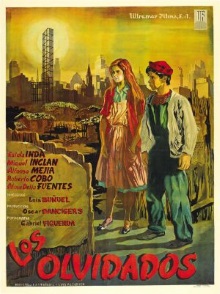
Spanish filmmaker Luis Buñuel is, I think, best known for his surrealist works as exemplified by his famous collaboration with Salvador Dalí, Un Chien Andalou. As such Los Olvidados, being a more realistic and grounded story is probably not representative of his body of work, though it does feature a dream sequence that gives you a taste of that style.
The Forgotten Ones of the title refer to the street children who live in the slums of Mexico City. Poor, frequently hungry and disdainful of paid work, they hang about aimlessly until their older leader El Jaibo escapes from jail and rejoins them. Under his direction, they graduate to more serious crimes which for the most part consists of mercilessly taking advantage of those even less privileged than themselves, the infirm and the handicapped. A side plot deals with a young boy from the countryside that the gang nicknames Small Eyes who has apparently been abandoned in the city by his father.
As my wife remarked immediately just as the film ended, the whole thing is thoroughly depressing. The story tempts you to look for a redemptive arc of some kind for any of the characters but there is neither hope nor reprieve to be found here. This is succinctly captured in the plaintive cry of one of the smaller members of the gang, Pedro. He wants to be good, he says, but doesn’t know how. Sadly, no one seems to be able to teach him, not even his mother who asks why she should care for him when she doesn’t even know who his father is. No one is an angel in this film. One might be tempted to think fondly of the blind musician who becomes a victim of the gang who despite his gruff manner takes Small Eyes under his wing. Yet even he turns out to be lecherous old man who would happily see all of the delinquents strung up for their crimes.
Impressively, despite our inability to understand Spanish and the unfamiliar culture, we had no difficulty differentiating between the various characters or empathizing with their plight. That’s a testament to how vividly each one is painted amidst a milieu that is universally recognizable. The one exception to the relentless darkness is that the Mexican state is portrayed in an unfailingly positive light. The farm-school Pedro is sent to doesn’t seem half bad and even the court officials seem shocked that Pedro’s mother cares so little for him. This was probably due to government pressure and apparently an entirely different alternate ending with a traditional happy ending was filmed because the government insisted on upholding the country’s image as a progressive society free of poverty. Needless to say, this feels incongruous in the film given how miserable everything else is.
Still, it’s hard to accuse the director of selling out when you consider the kind of wholesome family values Hollywood was championing in the 1950s. If anything, the vision of is so hellish with children beating up cripples in the street and no one intervening that it feels unrealistic in a completely different direction. I can’t say that this is a film that anyone can like, but it’s certainly a riveting experience.